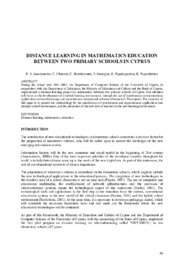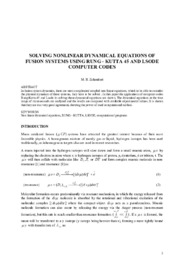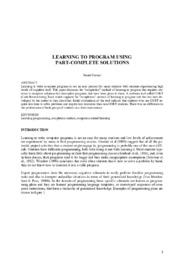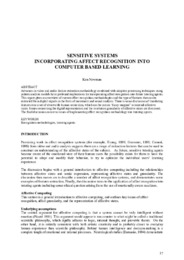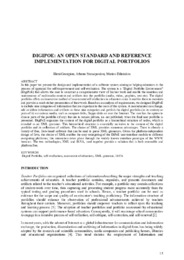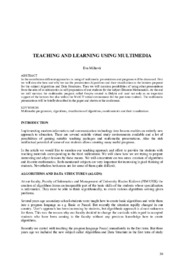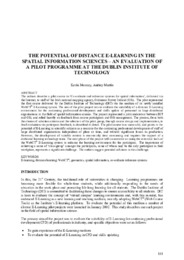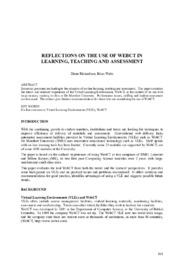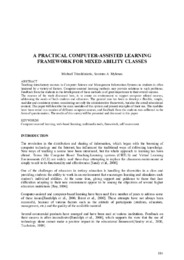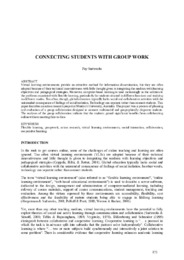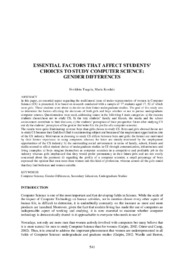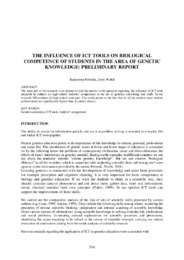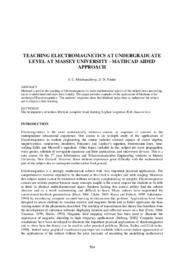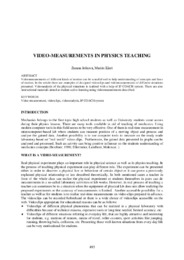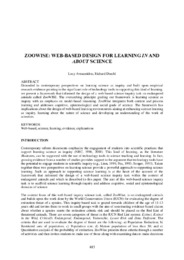Computer Based Learning in Science (CBLIS): Recent submissions
Now showing items 181-200 of 337
-
Distance learning in mathematics education between two primary schools in cyprus
(Department of Educational Sciences, University of Cyprus, 2003)During the school year 2001-2002, the Department of Computer Science of the University of Cyprus, in cooperation with the Department of Education, the Ministry of Education and Culture and the Bank of Cyprus, implemented ... -
Webcoct – a tool for producing web-based courses
(Department of Educational Sciences, University of Cyprus, 2003)The aim of the paper is to describe the project WeBCoCT (Web Based Courses Creating Tools) intended to become a learning environment to help academic teachers to introduce web-based courses. WeBCoCT has as its main goal ... -
Solving nonlinear dynamical equations of Fusion systems using rung - kutta 45 and lsode Computer codes
(Department of Educational Sciences, University of Cyprus, 2003)In fusion system dynamics, there are most complicated coupled non-linear equations, which to be able to consider the physical dynamics of these systems, they have to be solved . In this paper the applications of computer ... -
Learning to program using Part-complete solutions
(Department of Educational Sciences, University of Cyprus, 2003)Learning to write computer programs is not an easy process for many students with students experiencing high levels of cognitive load. This paper discusses the “completion” method of learning to program that requires ... -
Sensitive systems Incorporating affect recognition into Computer based learning
(Department of Educational Sciences, University of Cyprus, 2003)Advances in video and audio feature extraction methodology combined with adaptive processing techniques using pattern analysis models have profound implications for incorporating affect recognition into future tutoring ... -
Virtual optical illusions for creative learning
(Department of Educational Sciences, University of Cyprus, 2003)An amazing “rotating ring” optical illusion was studied in the frames of the students’ educational computer-based research work. Virtual images of differently shaped moving objects were simulated in QBasic 71, MS Visual ... -
Digipoe: an open standard and reference implementation for digital portfolios
(Department of Educational Sciences, University of Cyprus, 2003)In this paper we present the design and implementation of a software system aiming at helping educators in the process of appraisal for self-improvement and self-evaluation. The system is a "Digital Portfolio Environment" ... -
Teaching and learning using multimedia
(Department of Educational Sciences, University of Cyprus, 2003)In the contribution different approaches to using of multimedia presentations and programs will be discussed. First we will describe how and why we use the presentation Algorithms and their visualisation in the lectures ... -
The potential of distance e-learning in the Spatial information sciences – an evaluation of a pilot programme at the dublin institute of Technology
(Department of Educational Sciences, University of Cyprus, 2003)The authors describe a pilot course in ‘Co-ordinate and reference systems for spatial information’, delivered via the Internet, to staff of the Irish national mapping agency, Ordnance Survey Ireland (OSi). The pilot ... -
Reflections on the use of webct in Learning, teaching and assessment
(Department of Educational Sciences, University of Cyprus, 2003)Economic pressures are leading to the adoption of on-line learning, teaching and assessment. This paper considers the tutors' and students' experience of the Virtual Learning Environment, WebCT, in the context of its use ... -
A practical computer-assisted learning framework for mixed ability classes
(Department of Educational Sciences, University of Cyprus, 2003)Teaching introductory courses in Computer Science and Management Information Systems to students is often hindered by a variety of factors. Computer-assisted learning methods may provide solutions to such problems. Feedback ... -
Connecting students with group work
(Department of Educational Sciences, University of Cyprus, 2003)Virtual learning environments provide an attractive method for information dissemination, but they are often adopted because of their technical innovativeness with little thought given to integrating the medium with learning ... -
Telecommunications technologies and Curriculum development: the case of a virtual High school project
(Department of Educational Sciences, University of Cyprus, 2003)In this paper we present the lessons we learned from developing online classes for a virtual high school (LUDAVHS) project and discuss the implications for teaching science using telecommunication technologies. Emphasis ... -
Essential factors that affect students’ choices to study computer science: gender differences
(University of Zilina, 2005)In this paper, an essential aspect regarding the multilateral issue of under-representation of women in Computer Science (CS) is presented. It is based on research conducted with a sample of 77 students aged 17, 52 of which ... -
An analysis of awareness of students in the utilization of technology
(University of Zilina, 2005)With the rapid advancements in technology, people are being more tied with the technological tools and materials that meet the requirements of the society. The increase of knowledge with support from technology augments ... -
The influence of ict tools on biological competence of students in the area of genetic knowledge: preliminary report
(University of Zilina, 2005)The main aim of the research is an attempt to find the answer to the question regarding the influence of ICT tools prepared by authors on high school students’ competence in the are of genetics knowledge and skills. In the ... -
Teaching electromagnetics at undergraduate level at massey university - mathcad aided approach
(University of Zilina, 2005)Mathcad is used in the teaching of Electromagnetics to make mathematical aspects of the subject more interesting, easier to understand and more user friendly. This paper presents examples of the application of Mathcad to ... -
Conceptual learning of selected physical topics through interactive multimedia
(University of Zilina, 2005)In the contribution there is the importance of selected physical phenomena regarding to the physical thinking of students presented. The results of pedagogical research show limited understanding of selected physical ... -
Video-measurements in physics teaching
(University of Zilina, 2005)Videomeasurements of different kinds of motion can be a useful tool to help understanding of concepts and laws of motion. In the article there are examples of designed videoclips and videomeasurements of different situations ... -
Zoowise: web-based design for learning in and about science
(University of Zilina, 2005)Grounded in contemporary perspectives on learning science as inquiry and built upon empirical research evidence pointing to the significant role of technology tools in supporting this kind of learning, we present a framework ...
